It was not just partition of territories but also of minds, says author Ram Madhav
Mysore/Mysuru: The partition of 1947 was not just of land but of hearts as well. The narrative and discourse that Hindus and Muslims cannot live together is dangerous, divisive and every Indian must be cautious about this agenda, said noted thinker, author and National Executive Committee Member of the RSS Ram Madhav.
He was speaking at the launch of his book ‘Partitioned Freedom’, a lecture, discussion and interaction organised by Manthana Mysuru this morning at Vijnana Bhavan in Manasagangothri.
“Nobody wanted partition yet it couldn’t be averted. Four decades earlier, in 1905, Bengal was partitioned by the British. A massive movement, called ‘Vande Mataram Movement’, was launched against it by the Indian National Congress. British were forced to annul the partition of Bengal in 1911,” he recalled.
“When Bengal was partitioned in 1905, the whole country stood behind Bengal, and the whole nation was engaged in agitation. But when Jinnah declared Pakistan and India partitioned in 1947, India did not stand up. My book answers what happened between 1940-47 and what changed between 1911-1940,” he said.
Lala Lajpat Roy, Bal Gangadhar Tilak and Bipin Chandra Pal led the movement from the front. The British bowed down, and King George himself came to take back the decision and undo the partition. Indians won in that battle and the nation remained united, he noted.
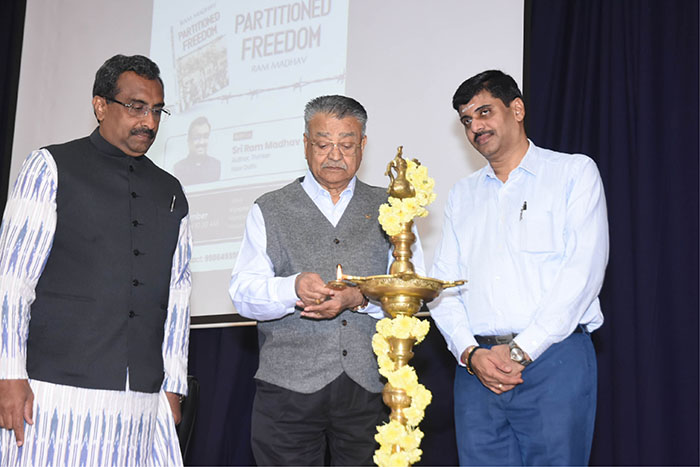
About Gandhiji and Jinnah
“This book is of Gandhiji and Jinnah. Both are from Gujarat, barristers. Jinnah was instrumental to bring Muslim League and Congress to Lucknow Conference. But he left Congress in 1920, citing Gandhi’s intervention in Khilafat Movement. He stayed low-key and came back to the limelight in 1935. Jinnah then became a champion of Muslim politics in India. This is a story of that leader,” he revealed. On the other hand, Gandhiji came to India in 1915 and he had experienced Africa. He had a notion that Hindu-Muslim unity was first and freedom came next. In 1919, he became the President of Khilafat Movement. In return, he expected help from Muslim community for Congress in freedom movement. He gave concessions after concessions for Muslims be it Vande Mataram, national flag, bhajan, language, everything.
Fuelling communal passions
From 1920 to 1935, a separate electorate for Muslims was accepted by Congress. This phase of appeasement did not make Muslims come close to Congress and instead resulted in partition. “During the last decade of the struggle, Gandhi tried to ensure that India stayed united but it was too late as we had already nurtured the demon,” he said.
No doubt that Gandhiji had the best of intentions regarding the preservation of our cultural ethos as well as Hindu-Muslim unity, but the extent of compromise that his idealism demanded later only led to fuelling communal passions unfortunately, he said.
“This is a tragic story of two leaders. Finally, this story of partition gives us two important messages. Firstly, never indulge in appeasement of the forces who are about to destroy the integrity of the country, and secondly ponder on why we succeeded in 1911, and not in 1947. The answer is the country should be vigilant by itself and not depend on anyone in particular for the unity of the country,” Ram Madhav added.
“The Partition was not just partition of territories but also of minds, which needs to be seen with utmost seriousness and care. We need to build a united Indian society. It can happen only if the leadership and elements that believe in separatism and communal separation are discouraged. A sense of one nationhood needs to be encouraged,” the author noted.
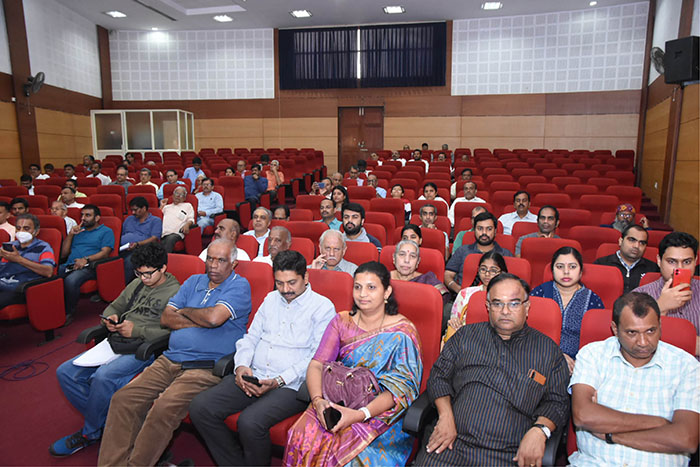
Indian history is complex
Releasing the book, Founder-Editor of Star of Mysore and Mysuru Mithra K.B. Ganapathy noted that every society assumes history means only political history. We must remember there is social history, economic history etc., in a society. “There is no country in the world where we find political vacuum as there will be someone who will fill the vacuum, hence the importance of political history,” he said.
Apart from Roman history, Indian history is the most complex like a fathomless ocean. “India is an eternal country and despite many challenges India faced over centuries, we still survive in a truncated manner geographically. Though India has been partitioned, our spirit, mind and culture is alive. The civilisational aspect of Hinduism is expanding and will never cease to exist,” Ganapathy said.
Recalling the division of Bengal in 1905, Ganapathy asked if Bengal that was divided during British rule into two was united later in 1911 following protest, why our leaders could not stop India’s partition. “I do not know if the leadership then was up to the challenge. Why did the tall leaders of that time allow the country to be divided? I believe that falling silent in times of crisis is nothing but cowardice. But can we undo the partition? We probably cannot. Only time alone can answer this question,” he said.



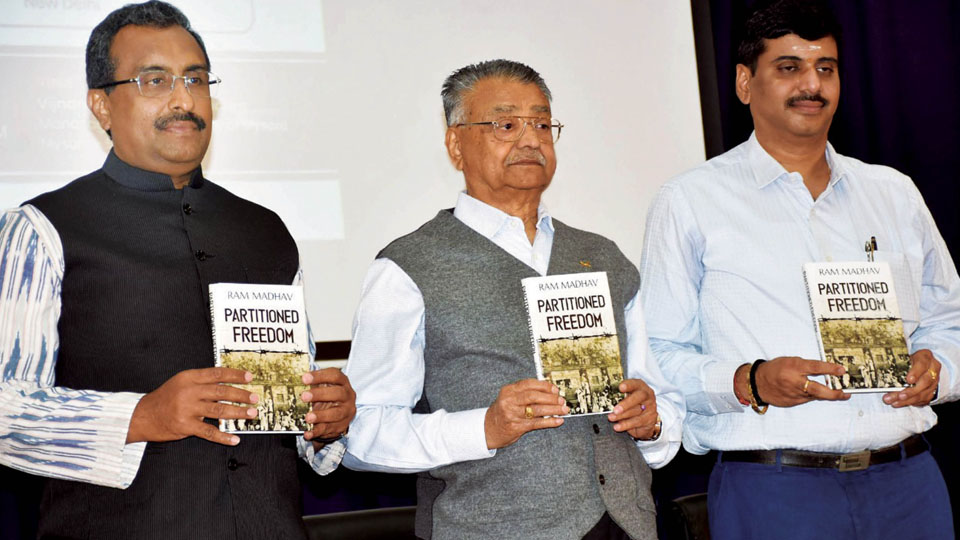
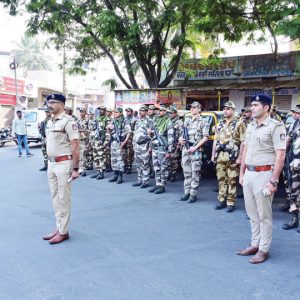
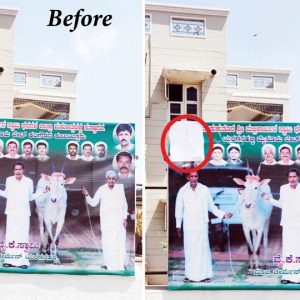
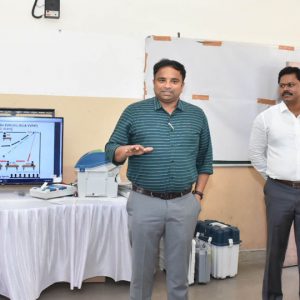
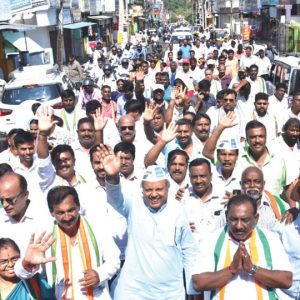
Partition happened because of 4 or 5 self centered people decision instead of getting the opinion of the whole nation.
@swamy
You do not read history, and hence your misinterpretation. Partition happened because, one of Gandhi’s closet allies, so he thought, Muhammad Ali Jinnah, would not agree with the British granting independence to India, unless, he gets a separate country of Islam for Muslims, carved out of India. Gandhi, the ever Muslim lover, offered him to make him the PM of undivided India, if he dropped his demand, but Muhammad Ali Jinnah would not relent. The rest is history.
Partition was good. The bad about it , was unlike Turkey and Greece when each of them became independent, and exchanged their minority populations-Turks in Greece going to Turkey and Greeks in Turkey coming to Greece, India did not send its Muslim population to Pakistan and did not receive Hindus there back to India.
Gandhi urged Nehru to be a big -hearted PM, welcoming Muslim minority in India, and offering them the special personal laws. Just loom at what these laws did to one poor old Muslim woman with children-read Shah Bano case.
Nehru condemned India to eternal misery by making Hindus the second class citizens over Muslims.
If opinions of India-the undivided India was sought, there would be massive support for the partition.
Hindus and Muslims simply cannot live together in a nation. A peace-loving religion against a militant religion, is not compatible.
Indian independence movement got a lot more complex because Gandhi and Nehru wanted it without any bloodshed while Savarkar and RSS wanted it with an armed struggle. Because Muslims did not trust Gandhi he had no control. So Gandhi used his influence to stop Hindus from any resistance. Even today Congress is upset at the thought of Savarkar getting any respect.
Somehow People seem to use Gandhiism as an escape from doing their job. Some people think Gandhiism is a solution to everything, especially the ones that want india to fail
https://youtu.be/66JghPmmkHk
@AAP
You are as dim witted and wicked as your leaders in New Delhi, who claiming better administration, but are worse than Congress and the BJP politicians in pocketing bribes.
I have seen their operations in New Delhi, and I know their worst excesses.
As for your post, it is nonsensical and crap ki ints reasoning and shows how ignorant you are in regards to Indian history of independence.
@Murthy
I do read your inane comments again born out of ignorance, and you silly trust in links where the information you provide, you consider as Gospel!
Both of you need re-education, particularly you seem to have missed studying Indian history in your bad school years.
@AAP and Swamy!! yes, you need you both need some re-education as what you learnt in your schools was no good! Believe me, you may have highly marketable good degrees! But that is not a good education!
Here is the only way of getting a real education!
You should flunk in your exams starting from your teenage years and make sure to drop out as soon as you reach college. Then spend all your day time in front of coffee shops with your friends who also have similar levels of success in their school years. Elders may feel disgusted about your life, but believe me, one day you can reach the heights of an expert commentator in SOM and call others brainless!
This may earn the scorn many people in public including your parents and family members, but you have to be tolerant and their spit and scorn hardens you in life. As a pastime, you can spend your time with conversations regarding local and national politics, and any topics that interest you!
After spending a wasteful life for decades you will observe that all your friends have surpassed you. That is where you can will initially be envious and later will show symptoms of full blown jealousy towards anybody who is gainfully employed or more useful than you!
Believe me ! It is such a ‘Tapasya” ! not suitable for mortals like us!
Sorry, to say ! it is too late for mortals you to get the good education.
@Questo. I agree that Nehru should have followed Greece and Turkey model..